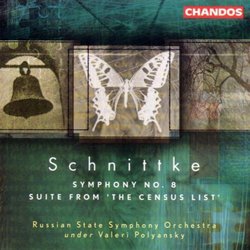| All Artists: Alfred Schnittke, Valery Polyansky, Russian Symphony Orchestra Title: Schnittke: Symphony No. 8/Suite from 'The Census List' Members Wishing: 0 Total Copies: 0 Label: Chandos Release Date: 5/22/2001 Genre: Classical Styles: Historical Periods, Modern, 20th, & 21st Century, Symphonies Number of Discs: 1 SwapaCD Credits: 1 UPCs: 095115988527, 095115988527 |
Search - Alfred Schnittke, Valery Polyansky, Russian Symphony Orchestra :: Schnittke: Symphony No. 8/Suite from 'The Census List'
 | Alfred Schnittke, Valery Polyansky, Russian Symphony Orchestra Schnittke: Symphony No. 8/Suite from 'The Census List' Genre: Classical |
Larger Image |
CD Details |
CD ReviewsBuy Rozhdestvensky's Recording, NOT this one Daniel J. McConnell | Madison, Wisconsin | 08/20/2004 (3 out of 5 stars) "Whereas another reviewer on this site recommends this recording over Rozhdestvensky's of Symphony No. 8 (also on Chandos), I'm inclined to suggest the reverse. This recording is plagued by often comical performance problems NOT present on the other recording. At the very start of the symphony, for instance, the fourth horn is unable to play in the extreme low register notated by Schnittke and thus transposes those low-register pitches an octave higher. For shame! In another passage during the first movement, the first trumpet performs nearly a quarter-tone higher than the rest of the orchestra. What an uncalled-for grating effect, literally: the violins and trumpet are suppose to be playing in unison! Again during the first movement - an ostensibly steady-flowing passacaglia - the brass and strings continually, and unevenly, rush and drag the tempo. While the strings play at one speed, for instance, the trumpets gradually surge ahead. At another moment: immediately after the trumpets play the passacaglia theme at one speed, the horns answer by performing the same theme at a tempo markedly slower than the trumpets, as if to put the "brakes on." An acoustic reprimand to the speeding trumpets? Hmmm. No doubt Schnittke's Symphony No. 8 is tough, which this recording underlines, time and again, through its errors. But this symphony is also fantastic, wonderful music. Buy Rozhdestvensky's recording; it unlocks (some of) the beauty composed into the challenging instrumental lines of Schnittke's piece." The ultimate recording of the Eighth! villegem | canada | 07/25/2001 (5 out of 5 stars) "Poliansky lately has turned out amazing recordings of Schnittke's spiritual symphonies. This latest is all together from another planet than the previous Chandos recording by the Stockholm Orchestra. The tension is present from the first to the last note and there is such a vibrant feel of life in this late work that never was present in the previous recording. A must have!" 5 star review based on second piece Moniker | United States | 05/26/2007 (5 out of 5 stars) "What is wrong with people? I'm not going to comment on the 8th Symphony, as I haven't heard it yet, but the "throw away" piece on here, the one that is supposedly "forgettable" is in my insignificant and uneducated opinion, amazing. I don't know how ANYONE who likes Schnittke can have such unfavorable opinions about some of his pieces like this one and Peer Gynt, when such a huge part of the composer's aesthetic and approach was to write material that is equally "heavy" spiritual and intellectualized as it is whatever the pretentious, boring snobs would like to label stuff like the Gogol/Census suite. To quote the composer himself "The goal of my life is to unify serious music and light music, even if I break my neck in doing so." Then again, what the hell do I know. I guess I'm probably ignorant and I just don't get it. Is it just a sequencing problem? Perhaps it's that in placing this quirky piece next to the gravity of the 8th, it seems absurd and of very little significance. I doubt it though.
Anyway, Nino Rota fans, as well as fans of Shostakovich's "light" music, will want to hear this so-called minor and insignificant piece, although this suite to me sounds much better than Shostakovich's stab at "light" music. Also, check out Schnittke's ballet Peer Gynt for very cohesive, strong writing in a lighter tone that is quite the contrast to his more sprawling and meandering works that are more about showcasing the technical aspects of performance. And also, be grateful that there were composers like Schnittke who realized that music has many facets and it need not be so serious ALL THE TIME. Sheesh." |
